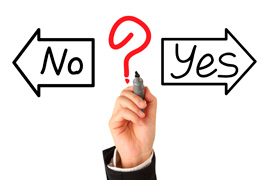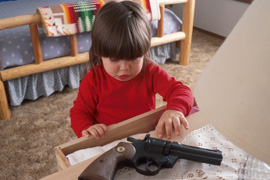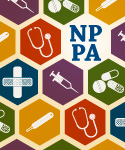January 26th, 2017
Can Medical Professionals Ask Patients About Guns?
Alexandra Godfrey, BSc PT, MS PA-C
A student recently asked me if clinicians can talk to patients about gun ownership and safety. Her question triggered my month-long search for data to provide a solid evidence-based response.
Alas, my research did not unearth such an answer. But I did find endless writing that discussed this increasingly contentious question in terms of rights, ideology, law, politics, ethics, and medicine.
I realized that if we are to have an honest discussion about the relevance of gun safety to medical practice, it is essential to study the major conundrums that have caused polarization among patients, providers, state legislatures, and medical organizations. The American Medical Association (AMA), the American Academy of Pediatrics, and the Society of Adolescent Medicine are examples of organizations that encourage clinicians to counsel patients about gun safety; they oppose legislative action that limits or obstructs such discussions. Florida and Montana are examples of states that have passed legislation that limits questions by physicians about gun ownership, a stance supported by gun lobby groups.
The Issues
Can we legitimately call gun violence an epidemic like polio, measles, and HIV?
According to gun lobby groups, gun violence is not an epidemic. Epidemics refer to diseases; more specifically, to surges in infectious disease. The use of the word epidemic is a misnomer aimed at creating an emotional response. Some dismiss such language as rhetoric and hyperbole, lacking in caliber and sincerity.
 Undeniably, epidemic in the past was limited to infectious diseases. Today, the scope is much broader: an epidemic refers to a condition, disease, or undesirable phenomenon that affects a disproportionately large number of the population. Such new definitions can be seen in dictionaries like Merriam-Webster and the Oxford English dictionary: “the practice had reached epidemic proportions” or “an epidemic of crime.” Given this change, it is reasonable to refer to gun violence as an epidemic.
Undeniably, epidemic in the past was limited to infectious diseases. Today, the scope is much broader: an epidemic refers to a condition, disease, or undesirable phenomenon that affects a disproportionately large number of the population. Such new definitions can be seen in dictionaries like Merriam-Webster and the Oxford English dictionary: “the practice had reached epidemic proportions” or “an epidemic of crime.” Given this change, it is reasonable to refer to gun violence as an epidemic.
If we look at an epidemic as “a surge” or disproportionate increase, such terminology becomes questionable. Firearm mortality rates have generally remained stable over the past 30 years. The agency defines an epidemic as “a recent increase in amount or virulence of [an] agent.” I am not sure we can say gun violence is virulent, although it may feel so at times. If we consider gun violence in terms of type, then we can see America has had a stark increase in mass shootings — namely an epidemic. Precision in the language of medicine matters.
What about the data?
According to the CDC, the total number of firearm-related deaths in 2015 was 36,252; of these, 2824 affected individuals aged 0-19 years. Mortality data can be subdivided into suicide, homicide, legal, and unintentional. Whether or not you consider these numbers to be disproportionately large is somewhat subjective: how many deaths from firearms are too many? Gun lobby groups cite that few of these deaths are accidental; some are related to gang violence or are suicides, but this surely leaves us making value judgments according to intent, mechanism, or ideology. Are deaths from suicide any less preventable or tragic?
How do we define a “public health issue,” and are guns a threat to public health?
Gun groups contend gun violence is not a public health issue, as most injuries and deaths occur from the negligent or malicious use of a firearm. It is neither a disease nor a medical problem. Thus, questions regarding gun control and measures to ensure public safety should be under the jurisdiction of the legal system. The National Rifle Association sees the public health approach as an attempt by medical organizations at gun control.
Public health is defined by the CDC Foundation as “the science of  protecting and improving the health of families and communities through promotion of healthy lifestyles, research for disease and injury prevention.” Given the number of injuries caused by firearms, it is legitimate to consider gun violence a public health issue. Merriam-Webster also includes “preventive medicine” as part of its definition of public health. Talking to patients about gun ownership and safety is preventive medicine.
protecting and improving the health of families and communities through promotion of healthy lifestyles, research for disease and injury prevention.” Given the number of injuries caused by firearms, it is legitimate to consider gun violence a public health issue. Merriam-Webster also includes “preventive medicine” as part of its definition of public health. Talking to patients about gun ownership and safety is preventive medicine.
Are questions about gun ownership an invasion of privacy or violation of the Second Amendment?
Gun lobby groups and gun owners see questions about ownership of firearms as a value judgment. Some worry that documentation of gun ownership in medical records might be accessed by the federal government to create databases. Others consider clinician questions about guns as a challenge to their Second Amendment rights. They cite fears that the information will be used to discriminate against gun owners or discourage gun ownership. They consider these discussions to be an underhanded means of promoting an anti-gun political agenda.
Medical organizations argue that personal questions are an essential part of medical practice inherent to the clinician-patient relationship. Pediatricians ask about guns just as they would car seats, swimming pool fences, and safe storage of noxious chemicals. Patients have the right to decline to answer such questions. Additionally, the AMA suggests that “physician gag laws” violate the First Amendment rights of clinicians.
Reconciling rights and ideology with the Hippocratic Oath (duty to protect) is difficult. In response to my student’s question: yes, medical professionals can ask about gun ownership and safety, but they need to be attentive to state legislation that sets parameters for such questions and cognizant of the patient’s right not to answer. A reasonable approach is to ask such questions in situations where gun ownership and gun safety are relevant to the context of the encounter: a well-child check, gun-related injuries, or when patients are at risk of suicide or homicide.



This post must have originated in the USA – the land of “free” (= commercial interest permitted) speech.
Poor Ralph Nader – noticed car related deaths – suggested safety devices – was persecuted, stalked, and personally attacked by GM. But that was 50 years ago, right? Today you are permitted to ask about baby seats.
Are health care providers working for “health” of the citizenry – or other values?
This would depend how you determine origin. If you determine this simply by the country that produces this blog or the country of the writing, then sure. If you determine the origin of writing as coming from the author, then I am not certain you are correct about origin. Some say Thailand is the land of the free as it has never been colonized. There are many definitions of liberty. I imagine being free to pursue commercial interest is one of them but not the drive for this writing.
I am certain that healthcare professionals have many drives, and I hope health of the citizenry is the primary one. Of course, political focus, social constructs, value systems, ideology along with many other variables might influence practice style or emphasis. We could ask: does passing state legislation that limits or prohibits certain clinical conversations set a precedent for political or ideological interference with other vital clinical conversations?
Thank you for your response.
Thanks – I believe under “origin” I meant culture of reference in the article (the question of “some people” getting offended about asking about weapons is almost unimaginable in Canada or Australia – places where I have lived for thirty years each.)
Health care systems function WITHIN their cultures, and judging by the deaths from weapons in the USA, and the topic of this post, that culture values it’s weapons possession possibly more than it’s health values.
THAT is my observation.
I completely sympathize with those agents of health care struggling against these and similar (opiate availability, food system issues, and even the very point of access (to some) of health care).
I’m more watching the observations of others – both inside and outside the US culture.
Thank you Max for the clarification. Yes; as you said the culture of reference is US. Having been born, raised and employed in the UK, I do have a different culture of reference, which makes writing such an article both challenging and easy in some regards. I do not hold firmly to a particular party nor was I raised with the US constitution. Watching from inside and outside US culture is in my perspective an excellent way to learn. I strive to understand the culture I work in, even though it feels foreign at times.
Thanks Alexandra – I am also bicultural – Australian and Canadian. 20 years ago Australia had a mass shooting event – IMMEDIATELY the parliament passed a law banning such weapons. Total mass murder deaths since then – zero (compared to a dozen or so dead PER MONTH in the US (President Obama’s statistics). Could you imagine this happening in the USA? Are these just “differences in opinion”?
(like “our national sport” (bull fighting/ football) with “animal cruelty”/ “brain damage for the young”?
I am a severe cultural skeptic. You are possibly a cultural eclectic?
Max – cultural eclectic ? You may very well be right. Made me smile. And I agree about Australia. Similar to the changes in the U.K. gun laws after the 1996 Dunblane shootings. None since.
As one of my colleagues says, anyone can get a good medical history, if he knows the presentation, symptoms and natural history of about 12,000 diseases. Likewise, one can have a good patient conversation about weapons if he/she knows types, actions, capabilities, uses of different types. As an example, a history that says that an individual is a waterfowl hunter or an elk hunter, or that he has a concealed carry permit, would say volumes about the person and presume that he has weapons also. To merely state that a person has a weapon, might not tell anything at all.
Ms Godfrey has provided a well-researched commentary on a topic of concern to many. I think one barometer for evaluating the partiality of what she has to say is whether or not the reader can tell what Ms Godfrey’s bias is. I can’t. Bravo!
This same logic would require questions about car ownership and seat belts as the fatality rate is higher.
Jim,
Excellant point!
Let us also not forget about ladders, baseball bats, lawn mowers, and gas ovens. All equally as dangerous.
I think we do talk about baseball bats, lawn mowers and gas leaks in the right context. And I think I emphasized context . In the case of an MVC, I always talk about seatbelts, substance abuse and so. It matters.
I do also believe in preventative medicine. The items you mention are not typically used to kill or as an agent for suicide and are not quite so effective. Consequently, asking about them is of less import. Anything can become a weapon of course. I am never quite sure how such analogies make sense. According to the Uniform Crime reports available on the FBI website firearms account for 67% of homicides and blunt trauma (baseball bats, hammers) account for 3.9%. Not “equally” dangerous then.
We see similar data on the national injury reports on the CDC website regarding injuries and suicides. . Yes- we could ask about every little thing but the emphasis here is on guns because greater than 36, 000 people died from them in 2015. As for cars, we do have strict safety regulations that govern design, build and use. Everyone takes a driving test. We mandate seatbelts, insurance, infant car seats, and rule against DUI. Designers are pushed to work on safety features like side impact protection and so on. Far more safety standards and regulations governing the use of car. Thank you for you comments. It is always good to look at data.
In our part of the country it is not wise to ask about guns. To do so might evoke a long discussion. Physicians are busy and to ask about guns might start long wasteful discussion between the physician’s gun collection and the patient’s collection!
A thoughtful piece indeed.
I have never been a gun owner. I wouldn’t mind very tight restrictions on gun ownership. I think our rate or firearms deaths is a national shame. And I deplore the tactics of the NRA and gun rights supporters. But I think our limited time is better spent on other matters.
The press and consequently each upsurge in anti-gun sentiment focuses on each new horrific event. American citizens lost to terrorism worldwide and mass shootings are tiny in comparison to suicides and individual shootings. Fivethirtyeight has a page devoted to these stats- https://fivethirtyeight.com/features/gun-deaths/ .
One would hope we could intervene before the suicides but that is an untested idea. We don’t even have any idea how many of those had contact with psychiatric or primary care before their suicides.
In our society, no question should be proscribed, provided the respondent is free to decline answering without consequence.
Thank you for the thoughtful post. However, I would be careful when quoting the AMA – they represent a minority of physicians and are losing more members. For some reason, the media continues to quote them as a ‘voice of doctors’. We don’t need to perpetuate that myth.
See links below.
https://www.ncbi.nlm.nih.gov/pmc/articles/PMC3153537/
https://medium.com/@ClinicianAction/the-ama-does-not-speak-for-us-d697511267d5#.emgs45wer
Thank you for the links and the reminder. Appreciated. You are correct; we cannot assume the AMA is the voice of physicians.
What you ask and say depends on your patient population and circumstance. Where I live to get a hunting license you have to pass an extensive hunter safety course. To buy a pistol a background check and police. The gun owner here likely knows more than you do. However there are times to say something, suicide threat, if you have children in the home keep guns unreachabke by them. When I lived in Chicago citizens didn’t have guns. Cops and criminals did and both aren’t going to listen to you.
Very well written. Look forward to reading more from you!
Nothing ever stopped me from talking about guns–but patients lie about addictions and gun possession is an addiction/obsession
No question about asking patients, especially adult males, regarding gun possession. I have clearly saved at least one life by working with a depressed patient’s spouse (with his consent, of course) that his guns were placed in the gun safe of a friend. Although I recently retired, I had already decided that if authorities by regulation attempted to restrict my freedom as a physician to ask these critical questions, I would continue to ask the questions even if I should thereby hazard legal sanction. Ditto with womens’ reproductive and contraception issues Luckily for me, I practiced in the haven of California. I deeply sympathize with clinicians and their patients residing in more ‘unenlightened’ states.
Since starting my NP practice in 1998, I have had no problem asking patients if they owned guns or where they keep them. As all of the Veteran’s were trained in weapon usage. I tell patients it is not a judgment but a discussion about gun safety. Most patients immediately say they have no children/grandchildren in the home…
The conversation doesn’t end there.